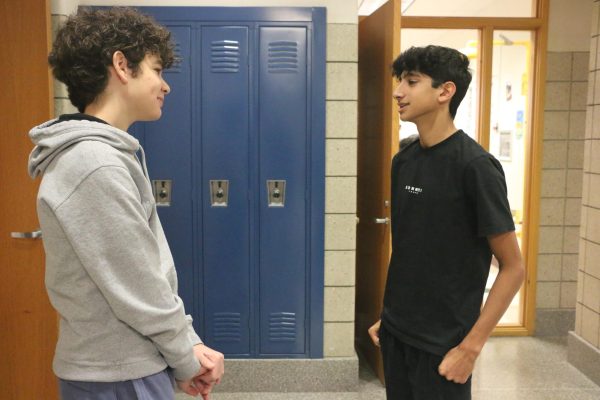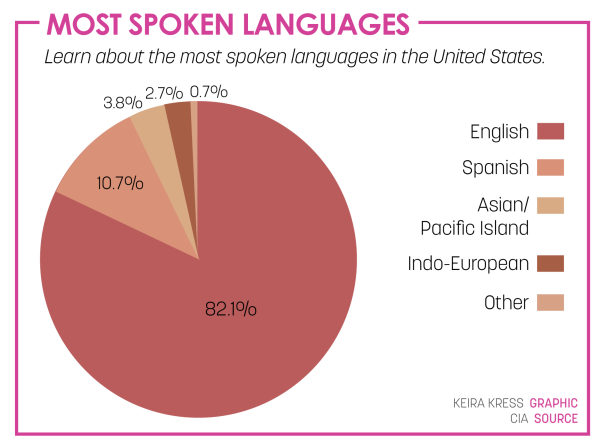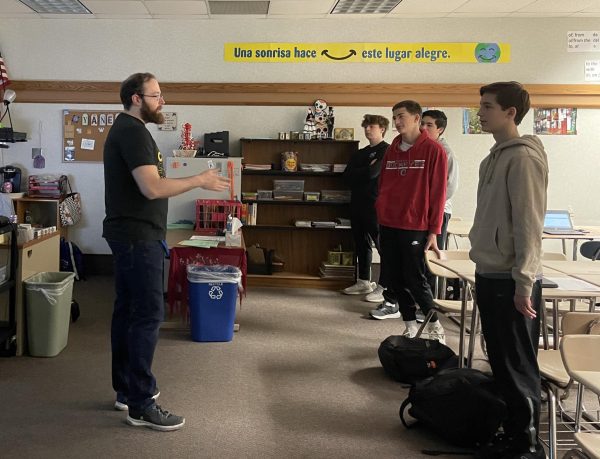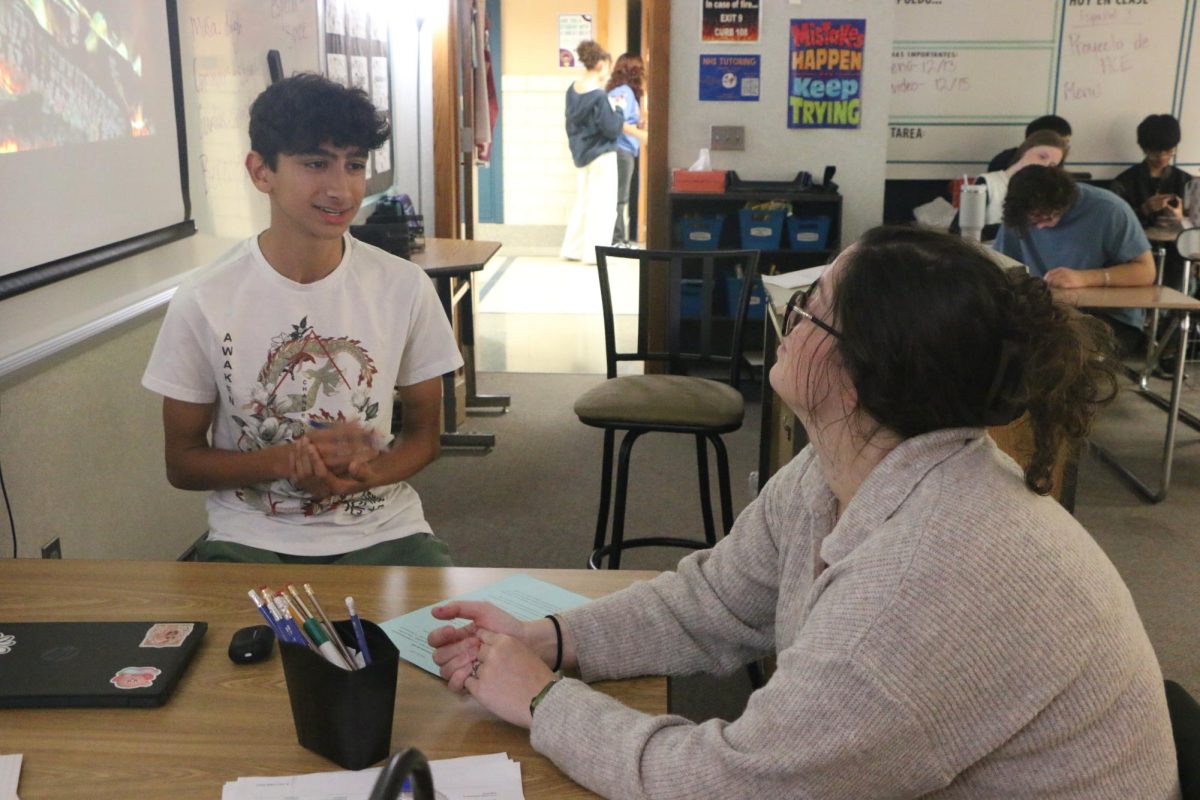Jan. 10 marks National League of Nations Day, a day dedicated to promoting cohesive culture and international cooperation. According to the Center for Immigration Studies, 67.3 million people in the U.S. are bilingual or multilingual. One of those people is sophomore Arjun Yadav.
“I speak English (fluently), and I am learning Spanish, Portuguese and Marathi,” he said.
Yadav said he started learning foreign languages to communicate with his peers and friends.
“On my soccer team, (there are) a lot of foreign players who either only speak Spanish or Portuguese,” Yadav said. “That made me really want to learn the language so I could properly communicate with them on the field and out of the field (where) I can socialize with them and understand their culture.”
Similarly, Junior Feryal Haider, who speaks English, French, Urdu and Hindi, said knowing foreign languages has helped her connect with her family more easily.
“I learned Urdu so I could talk to my family,” Haider said. “It’s what my parents speak in the house. (By knowing Urdu), I can talk to a lot of people, especially in my family, who don’t speak English.”
However, Haider said she learned most of the languages she knows because she had to.
“All of the languages I know I learned out of necessity,” she said. “I learned English because I had to, and I learned French because I needed a language to graduate, and I learned Urdu so I could talk to people in my family who don’t speak English.”

In contrast, Yadav said he uses online apps such as Duolingo to pursue his interest in foreign languages.
“I really like (Duolingo) and how there’s a streak part to it so you can stay doing it every day. My Duolingo streak is 815 days,” Yadav said.
Despite having learned foreign languages out of necessity, Haider said she still has seen benefits to knowing foreign languages.
“(Knowing other languages) has really elevated my experience in life,” Haider said. “I can talk to a lot of people that don’t speak English.”
Yadav said he agreed with Haider, and through knowing foreign languages, he has been able to gain new experiences.
“Talking to people (in different languages) is really fun,” Yadav said. “I get to use (different languages) with new people, and they’re impressed, and (they help me) learn about new cultures, and they can also just help me learn more and more.”
Spanish teacher Matthew Cinkoske, who speaks English, Spanish and Japanese, said he also sees both general cognitive and specific neurological benefits to learning foreign languages.
“(You can) change the way you think and (create) a deeper appreciation and understanding of different cultures,” Cinkoske said. “But there have also been studies that look at how (learning new languages) affects the brain and it tends to help delay the onset of brain diseases by 10 years.”
In addition, Cinkoske said knowing different foreign languages has introduced him to new cultural elements. Cinkoske said there are multiple different ways for people to learn about culture through language.
“Languages are inexplicably linked to culture in different ways. Sometimes that’s in very obvious ways; (for example), words for holidays and concepts that we don’t necessarily (have) in other cultures,” Cinkoske said. “Sometimes it’s a little more subtle, and (it’s more) about how you organize the world, how other people view the world, how they interact with other people.”

Furthermore, Yadav said learning foreign languages allows people to understand the world from other people’s perspectives.
“Many of the words within (other languages) describe certain meanings that they have different connections to,” Yadav said. “When I learn about different languages, I get to learn about how they (celebrate) certain holidays. (After learning about them), I think it’s really cool how they celebrate (specific cultural holidays).”
Cinkoske said he agreed, and foreign languages can give outsiders to a certain culture a look into how that culture functions.
“Simply through learning the language, you’re learning about how to interact with other people in an appropriate way, based on that culture and how they interact,” he said. “It also just creates access to a (wider) variety of viewpoints that you wouldn’t have access to otherwise. For example, reading the news in another language helps you understand how people outside of the U.S. understand the same world events that we’re interpreting in English and our own media.”
Despite all the benefits of learning foreign languages, Haider said there can be obstacles to actually learning the language in the first place.
“I think after you reach a certain age, (especially) when you’re learning a language in school, it’s a lot harder to absorb it because your brain isn’t as malleable at that point,” she said. “Since you’re speaking so many other languages, if you’re adding another one on top of that, it just gets hard to remember. Sometimes I confuse words across languages.”

Likewise, Yadav said a person’s native tongue and typical tendencies can make learning new languages more difficult.
“Pronunciation is really tough. I come from a mainly English background, and I’m trying to learn my home language Marathi, and it’s really difficult because it’s a totally new alphabet, a totally new way of using letters and combining them to make words,” he said.
However, Yadav said he still would encourage others to learn new languages at least once in their lives and emphasized the importance of putting adequate effort into learning.
“Be passionate about the foreign language (you’re learning),” Yadav said. “If you don’t really want to do it, you’re not going to keep up and you’re not going to really want to learn about it.”
Cinkoske said the learning process will be different for everyone. He said while learning the language may be a difficult process, there are many different benefits to it.
“Like any goal, you have to start somewhere. With languages, people like to think it’s a very sequential thing, but you can start anywhere and go from there. Some places are easier to start from, but if you just start and stay consistent, that’s half the battle,” Cinkoske said. “It’s like working out a new puzzle every time you try to create a new sentence. You can go to new places, see new people, see new things.”

































![AI in films like "The Brutalist" is convenient, but shouldn’t take priority [opinion]](https://hilite.org/wp-content/uploads/2025/02/catherine-cover-1200x471.jpg)










































![Review: “The Immortal Soul Salvage Yard:” A criminally underrated poetry collection [MUSE]](https://hilite.org/wp-content/uploads/2025/03/71cju6TvqmL._AC_UF10001000_QL80_.jpg)
![Review: "Dog Man" is Unapologetically Chaotic [MUSE]](https://hilite.org/wp-content/uploads/2025/03/dogman-1200x700.jpg)
![Review: "Ne Zha 2": The WeChat family reunion I didn’t know I needed [MUSE]](https://hilite.org/wp-content/uploads/2025/03/unnamed-4.png)
![Review in Print: Maripaz Villar brings a delightfully unique style to the world of WEBTOON [MUSE]](https://hilite.org/wp-content/uploads/2023/12/maripazcover-1200x960.jpg)
![Review: “The Sword of Kaigen” is a masterpiece [MUSE]](https://hilite.org/wp-content/uploads/2023/11/Screenshot-2023-11-26-201051.png)
![Review: Gateron Oil Kings, great linear switches, okay price [MUSE]](https://hilite.org/wp-content/uploads/2023/11/Screenshot-2023-11-26-200553.png)
![Review: “A Haunting in Venice” is a significant improvement from other Agatha Christie adaptations [MUSE]](https://hilite.org/wp-content/uploads/2023/11/e7ee2938a6d422669771bce6d8088521.jpg)
![Review: A Thanksgiving story from elementary school, still just as interesting [MUSE]](https://hilite.org/wp-content/uploads/2023/11/Screenshot-2023-11-26-195514-987x1200.png)
![Review: "When I Fly Towards You", cute, uplifting youth drama [MUSE]](https://hilite.org/wp-content/uploads/2023/09/When-I-Fly-Towards-You-Chinese-drama.png)
![Postcards from Muse: Hawaii Travel Diary [MUSE]](https://hilite.org/wp-content/uploads/2023/09/My-project-1-1200x1200.jpg)
![Review: "Ladybug & Cat Noir: The Movie," departure from original show [MUSE]](https://hilite.org/wp-content/uploads/2023/09/Ladybug__Cat_Noir_-_The_Movie_poster.jpg)
![Review in Print: "Hidden Love" is the cute, uplifting drama everyone needs [MUSE]](https://hilite.org/wp-content/uploads/2023/09/hiddenlovecover-e1693597208225-1030x1200.png)
![Review in Print: "Heartstopper" is the heartwarming queer romance we all need [MUSE]](https://hilite.org/wp-content/uploads/2023/08/museheartstoppercover-1200x654.png)




